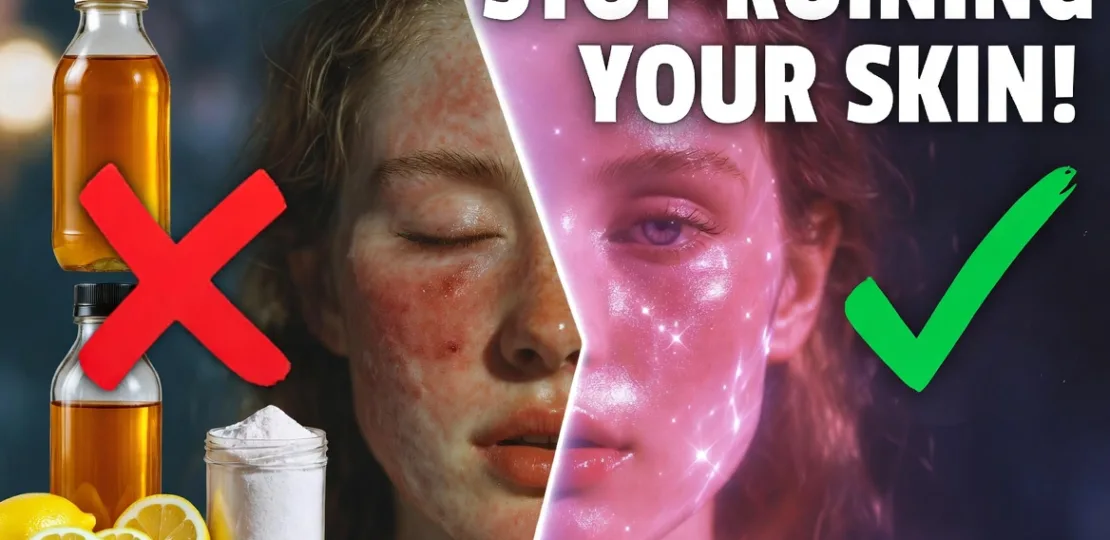Your skin barrier is more than just a protective layer—it’s your body’s first line of defense against environmental stressors, harmful bacteria, and moisture loss. When this barrier is compromised, you may experience redness, irritation, breakouts, and unexpected dryness. Surprisingly, many common home remedies and daily habits can silently weaken your skin barrier without your awareness.
In this article, we’ll explore the common causes of skin barrier damage, explain why maintaining a balanced microbiome is crucial, and provide practical solutions for restoring healthy, glowing skin. By following these tips, you can protect your skin naturally while avoiding the most common mistakes.
What Causes Skin Barrier Damage?
The skin barrier relies on a delicate balance of mild acidity (pH 4.5–5.5) and beneficial microbes that cover the surface. When this system is disrupted, harmful conditions develop.
Common offenders include:
- Undiluted acids (apple cider vinegar, lemon juice)
- Alkaline substances (baking soda)
- Strong essential oils (tea tree, cedarwood)
- Harsh chemicals (toothpaste, alcohol, peroxide)
- Over-exfoliation
- Steroid creams applied long-term
- Harsh tap water (chlorine, fluoride)
- Heavy chemical-laden makeup
1. Acids Can Burn and Irritate Skin
Using undiluted apple cider vinegar may feel “natural,” but its strong acidity can strip lipids, destroy microbiome balance, and cause chemical burns. Similarly, applying lemon juice before sun exposure may lead to inflammation due to photosensitive compounds.
Solution:
- Always dilute acids in water or carrier oils.
- Limit application to a small area for testing.
- Use sunscreen after citrus exposure.
2. Essential Oils Require Caution
Essential oils like tea tree and cedarwood are popular for acne and soothing purposes. Yet, concentrated application can trigger redness, inflammation, or even allergic reactions.
Solution:
- Dilute oils in a carrier oil (like jojoba or argan) at 1–2% concentration.
- Apply sparingly and avoid sensitive areas such as eyes and lips.
Morning Routines for Better Health – Energize Your Day
3. Alkaline Substances Disrupt Microbiome
Baking soda and other high-pH compounds neutralize your skin’s natural acidity, destabilizing the protective bacteria and making skin prone to infection, irritation, and dryness.
Solution:
- Avoid applying alkaline substances to the face.
- Stick to mild cleansers with pH 4.5–5.5.
- Support your microbiome with moisturizers rich in ceramides and fatty acids.
4. Toothpaste, Alcohol, Peroxide, and Hair Dye Are Too Harsh
These products are formulated for teeth or hair, not your face. Using them can:
- Kill good bacteria
- Over-dry the skin
- Cause burns or chemical irritation
Solution:
- Keep face-only products for facial skin.
- Use gentle facial cleansers and treatments.
5. Over-Exfoliation and Steroid Creams
Daily exfoliation strips away natural oils and destroys protective layers. Topical steroids may reduce redness temporarily but thin the skin over time and decrease collagen production.
Solution:
- Exfoliate 1–2 times weekly max.
- Avoid long-term steroid creams unless prescribed by a dermatologist.
- Use barrier-repair creams with ceramides and hyaluronic acid.
6. Environmental Factors: Water and Makeup
- Chlorinated or fluoridated water can damage skin barrier lipids.
- Heavy fragrances or chemical-laden makeup strain your skin microbiome.
Solution:
- Use filtered water for washing your face if possible.
- Opt for fragrance-free, non-comedogenic makeup.
7. Daily Habits for a Healthy Skin Barrier
- Gentle Cleansing: Use lukewarm water and mild, pH-balanced cleansers.
- Moisturize: Apply ceramide-rich or hyaluronic acid moisturizers to lock in hydration.
- Sun Protection: Always wear sunscreen with at least SPF 30.
- Patch Test: Before new products, test a small area for sensitivity.
- Minimal Products: Fewer chemicals = stronger skin barrier.
Discover How to Clear Skin in 6 Weeks Scientific Guide. Learn safe routines, avoid harmful products, and achieve a radiant, balanced complexion – start your journey to healthy skin today!
Conclusion
Your skin can naturally restore itself when given the proper care. Avoid harsh acids, alkalines, strong essential oils, and over-exfoliation. Respect its natural microbiome, pH balance, and lipid barrier. Over time, your skin will regain its healthy glow, resilience, and radiance.
FAQ Section
- What is a skin barrier and why is it important?
The skin barrier is the outermost layer that protects against bacteria, allergens, and moisture loss. Maintaining it prevents dryness, irritation, and infections. - How can I repair a damaged skin barrier?
Use gentle cleansers, moisturizers with ceramides or fatty acids, limit harsh chemicals, and avoid over-exfoliation. - Are natural remedies like apple cider vinegar safe for skin?
Only when properly diluted; undiluted acids can burn skin and disrupt the microbiome. - Why do essential oils sometimes irritate skin?
Strong concentrations can trigger redness, inflammation, or allergic reactions, especially on sensitive skin. - Can baking soda harm my skin?
Yes, high-alkaline substances disrupt skin’s natural pH and weaken its protective barrier. - How often should I exfoliate to protect my skin barrier?
1–2 times per week is sufficient; daily exfoliation can cause irritation and damage. - Do steroid creams weaken the skin?
Long-term use can thin the skin, reduce collagen, and impair local immunity. - How does makeup affect the skin barrier?
Heavy fragrances and chemicals stress the skin microbiome and can cause irritation or breakouts.
